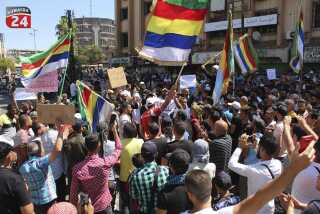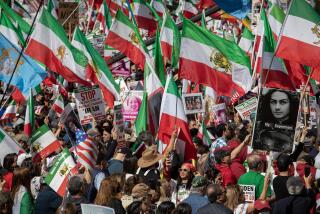Fears of bloodshed in Egypt as protests begin

- Share via
CAIRO -- Tents shine in the sun, banners flap and protesters, like an army regathering in an unfinished war, march down boulevards into Tahrir Square, where President Mohamed Morsi is cursed and scorned through loudspeakers crackling in the sweltering heat.
The latest protests against the Islamist president began Friday and are expected to culminate Sunday, the one-year anniversary of Morsi’s inauguration. The days ahead are crucial to Egypt’s future as a democracy and are likely to determine whether the nation will veer into factional bloodshed between Islamists and secularists.
Police fired tear gas in Alexandria to stop fighting, including stone throwing and shotgun blasts, between Morsi supporters and detractors. Al Azhar, the preeminent institute of Sunni Muslim learning, has warned of a possible civil war.
“I want to take Morsi out,” said Ahmed Abdelrazek, handing out stickers that read “Leave,” the short slogan of anti-government protesters demanding that Morsi step aside. “I want security to come back, and young people to find jobs. Morsi has done nothing right.”
The president and his Muslim Brotherhood party have “no prestige in the world,” said Talaat Ahmed, an engineering student, standing in the square beneath flags emblazoned with the faces of those killed during previous protests. “If he stays in power, we will have strife. We will turn into Iraq and the entire population will go up in flames.”
The Iraq analogy has become more common in recent months as Egypt has largely split into two volatile camps. While the mostly secular opposition chanted in Tahrir on Friday, tens of thousands of Islamists rallied for Morsi in front of a mosque across town. Clashes between Islamists and anti-government demonstrators have left four dead and more than 400 injured in recent days.
Morsi supporters argue that the president was fairly elected and that street protests have become the desperate strategy of a politically inept opposition. The president’s critics say he has violated democracy by expanding his power, sidelining the courts, persecuting his enemies, including journalists, and advancing the Islamist agenda of the Brotherhood and ultraconservative Salafis.
“Polarization and political conflict have reached a point that they are threatening our nascent democratic experience and the entire nation with paralysis and chaos,” Morsi said this week in a national address that failed to calm the passions arrayed against him.
But the dangers facing Morsi have now slipped beyond politics. The economy is imploding and the poor and the working class are restive. Morsi’s government has failed to convince many Egyptians that their lives are better today than they were more than two years ago when a popular uprising brought down Hosni Mubarak.
This disillusionment troubles the military, which ruled from 2011 until Morsi’s election. The army so far has shown little inclination that it wants to return to power, but it is concerned that Morsi is incapable of stemming the nation’s many problems and averting months of unrest that would further deter foreign investment.
“The Islamist elite and Morsi’s clan are not politically savvy. They are a missionary group and this is why they can’t rule,” said Mohasen Mohammed, a retired agricultural engineer. “It’s like putting someone in the water who can’t swim even though they have a bathing suit.”
Like many in Tahrir, Mohammed, sweat streaming from beneath her sunglasses, is calling for Morsi to step down and order early elections.
“This is why we are in the street and this is why we will not leave,” she said, flags snapping around her, the voices of activists chanting slogans in the unrelenting heat. “It’s just like we did when we got rid of Mubarak. We stayed here. I just pray we don’t fall into a civil war.”
ALSO:
Death toll in Xinjiang violence rises to at least 35
In Senegal, Obama touts U.S. initiatives to end hunger
Edward Snowden: Not the first to be caught in airport limbo
More to Read
Sign up for Essential California
The most important California stories and recommendations in your inbox every morning.
You may occasionally receive promotional content from the Los Angeles Times.











